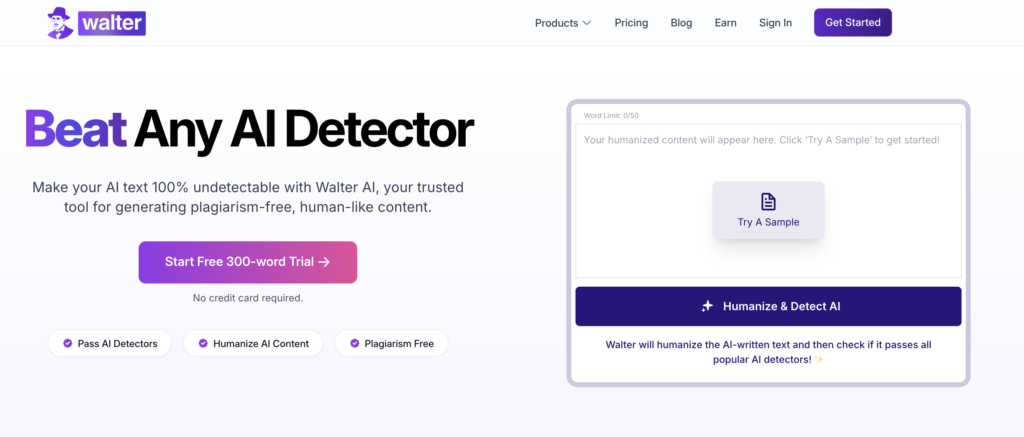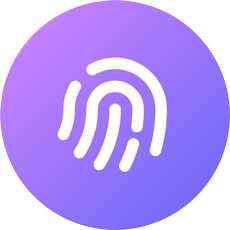Some days writing is like pulling teeth. You’re staring at a blank screen, the deadline is getting closer, and inspiration is nowhere in sight. For that, enter ChatGPT: your digital lifesaver. It’s fast, it’s easy and, I’ll be honest, it can be a bit addictive once you see how fast it cranks out content. But here’s the kicker — people are waking up. Professors, employers and even online platforms are employing AI detectors that can sniff out ChatGPT-generated content like bloodhounds on a scent trail.
If you’ve ever thought, “what if someone finds out I used AI?” you’re not alone. The good news? And there are simple but effective ways to help you make AI-verbiage sound natural, conversational, and (above all) undetectable.
In the following guide, we walk you through how AI detection works, what you can do to avoid being flagged, and how Walter Writes AI can rescue you from the agony of constantly revising your text. Let’s get into it.
How ChatGPT Detection Works & How to Avoid It

AI detectors aren’t magic—they’re algorithms looking for patterns that AI-generated text tends to follow. The problem? ChatGPT, as brilliant as it is, has certain habits that give it away. Sentences that are too perfect, oddly formal vocabulary, and a general “smoothness” that reads a little too… robotic.
Here’s what typically triggers AI detectors:
- Repetitive Phrasing: AI often reuses the same words or phrases, especially in longer texts.
- Even Sentence Lengths: Humans write with variety—AI tends to keep things neat and consistent.
- Lack of Personality: AI-generated text is usually missing that quirky, human touch.
- Overly Formal Tone: ChatGPT sometimes sounds like it’s writing a college essay when you just wanted a casual email.
How to Not Get Caught Using ChatGPT
The fix? Make your content sound more like you and less like a machine. Here’s how:
- Rewrite and Edit: Don’t just copy and paste. Change up sentence structures, use synonyms, and rephrase awkward bits.
- Add Your Voice: Include personal anecdotes, opinions, and casual expressions.
- Use Walter Writes AI: This tool helps humanize your text, giving it a natural flow that passes detection.
Quick Tip: Even small tweaks—like adding “Honestly,” at the beginning of a sentence—can make a world of difference.
Can You Really Get Caught Using ChatGPT?
In short? Yes. But it’s not inevitable. AI detectors are smart, but they’re not infallible. They look for patterns that most people don’t consciously notice—unless you know what to look for.
What AI Detection Tools Look For
Here’s how they catch you:
- Predictability: AI likes neat, uniform sentences. Humans? Not so much. Limited Vocabulary: ChatGPT likes to stay safe in word choices.
- Flat Tone: No excitement, sarcasm, or “um, what?” moments.
- Too-Perfect Grammar: Ironically, perfect prose might look suspicious.
I had a friend whose essay was flagged, but not because it was AI-generated; it was too perfect. We added a couple of informal phrases, changed some sentences around, and no flags anymore. In a way, imperfection is your best friend.
Are AI Detectors Always Right?
Not at all. In fact:
- False Positives: Well-written human content can get flagged.
- False Negatives: With enough editing, AI-generated text can pass undetected.
Bottom line: AI detectors aren’t perfect, but why take chances when you can easily outsmart them?
The Best Ways to Avoid ChatGPT Detection
Alright, but how do I actually do this? If you’re thinking this, don’t worry. Below are simple steps that would grant your AI-generated content a sound human.
1. Rewrite and Personalize: Though AI text often is clean, this is the problem—it’s not messy and charming like human writing.
Ways to Humanize Your Text:
- People speak on mixed sentence lengths. There are some long and short sentences. You get the idea.
- Speak with Conversational Language: Think how you would explain something to a friend.
- Filler Words: Including words such as “well,” “so,” or “honestly”, makes any writing sound a bit more natural.
Example:
- Original Version: “Exercise constitutes a great health enhancer and should be a part of everyday life.”
- Humanized Version: “I’m not saying you have to go to the gym every day, but if you can walk for even five minutes, it really contributes to that.” Trust me—I’ve been there.”
We can see how the second version sounds like a person talking. That’s what you’re aiming for.
2. Add Personal Stories and Opinions: AI can’t replicate your life experiences. Use that to your advantage.
Ideas to Add a Personal Touch:
- Mention something that happened to you recently.
- Share your thoughts, even if they’re silly or sarcastic.
- Include pop culture references or inside jokes (where appropriate).
Instead of: “Many people enjoy coffee,”
Try: “Not gonna lie, my day doesn’t officially start until I’ve had my first cup of coffee—preferably with way too much creamer.”
No AI can fake that kind of specificity.
3. Use AI Humanizer Tools Like Walter Writes AI for a Final Touch-Up: If you don’t have hours to spend rewriting everything, Walter Writes AI can help. It takes your AI-generated text and makes it sound natural, conversational, and (most importantly) undetectable.
What It Does:
- Reworks sentences to sound more human.
- Swaps out generic words for more engaging alternatives.
- Adds subtle variations in tone and structure.

Advanced Techniques to Stay Undetectable
Want to go the extra mile? These strategies can provide you an added layer of protection.
Test Your Work Before Submitting
Who wants to wait and let someone else catch up? Conduct your own AI detection with tools.
How to Self-Test:
- Generate your content
- Pass it through any AI detector (such as Turnitin or GPTZero).
- Change anything that is highlighted.
- Pass cleanly once again after some retests
It’s like proofreading—but for AI detection.
Blend AI Content with Your Own Writing
AI can help lay the groundwork, but your signature touch is what matters.
Tips to Blend Seamlessly:
- Take your own words and experiences to rewrite sections.
- Make it funny, informal, conversational, rhetorical.
- Rewriting 30-40% can significantly reduce detectability.
Is It Ethical to Use ChatGPT? Let’s Be Real
Look, just because you can deploy AI doesn’t mean you should. There is a fine line between working smarter and crossing ethical lines.
When Can You Get in Trouble?
- In School: Most schools treat it as cheating unless you’ve been cleared.
- At Work: Some companies have made using AI-generated reports a firing offense.
- Freelance gigs: Clients want originality — they’re buying your expertise, not a bot’s. When in doubt, ask. Better safe than sorry as they say.
How to Use AI Responsibly?
AI has to be a tool—not a crutch. Here’s how to keep things above board.
- Use ChatGPT for brainstorming, not for writing the final draft.
- Always retain your voice and perspective as part of the mix.
Tools like Walter Writes AI help you walk that line—giving you the benefits of AI without the risks.
Frequently Asked Questions (FAQ)
Not always. With proper editing—especially when using Walter Writes AI—you can easily avoid detection.
Edit your text. Weave in anecdotes, mix up the lengths of your sentences, and let AI humanizer tools do the polishing.
Yes! It rewrites your content into natural, human speech, eliminating the telltale signs AI detectors are looking for.
Not if you personalize it. Plagiarizing is about claiming someone else’s work as your own. AI is just a tool — it depends on how you use it.
Don’t panic. Revise the flagged sections, retest, and use Walter Writes AI to ensure you’re in the clear.
Conclusion: Outsmart AI Detection Without the Stress
AI tools like ChatGPT are incredible, but so too are detection systems, which are becoming very competent at spotting them. Use the platform that was speaking to you about turning the light on and add in the character and tools whenever possible as to present the information as human as can be done for ‘catching.
Quick Recap:
- Copy and paste? No thanks, the you; own it. Add personal anecdotes, opinions, and common colloquialisms.
- Walter Writes AI is capable enough to help you save time and bypass the detection tests. Once you make just a few changes to your content, it sounds 100% human, who’s going to seriously suspect you?
Ready to ditch the stress and start writing? Try Walter Writes AI today









